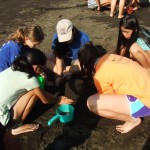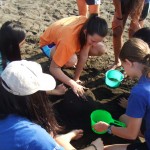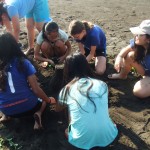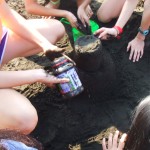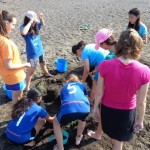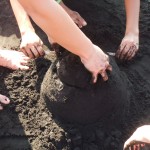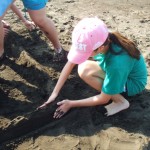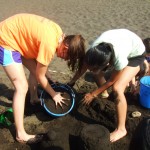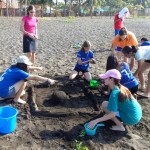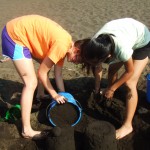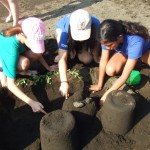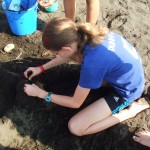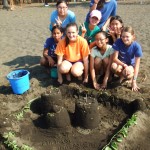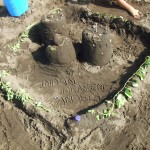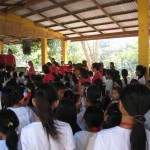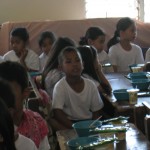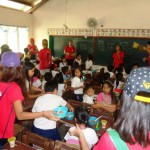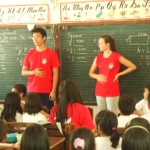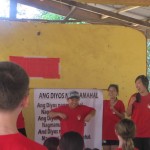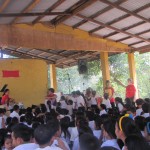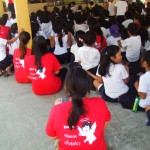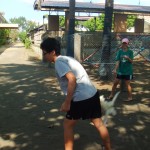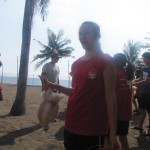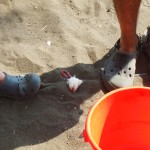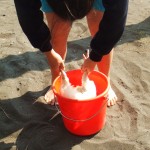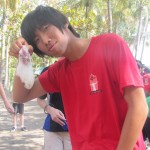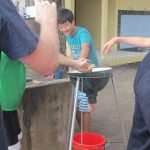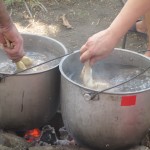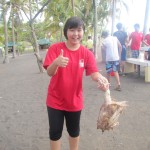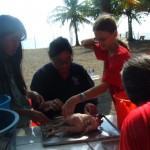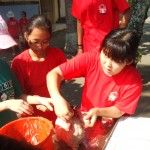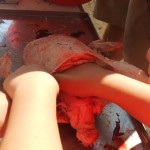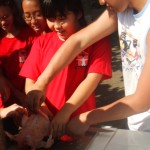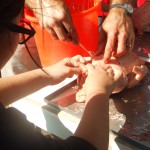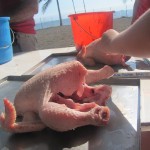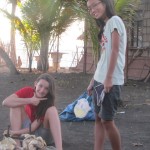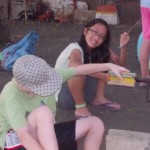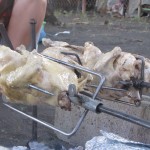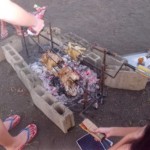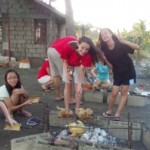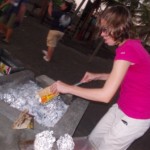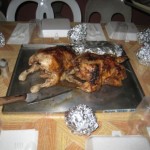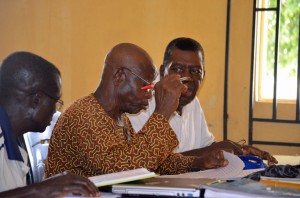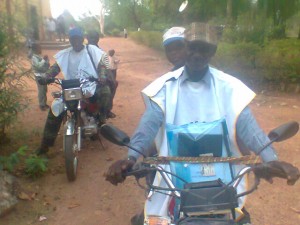missions
OE – Tuesday
On Tuesday my traveling group stayed at base camp. In the morning we built sand castles.
Then we had ministry time at a local Filipino elementary school. We took lunch to the students and played games with them. My squad had 3rd grade; there were 78 kids in one room. It was really full! After everyone had food we gathered together for a Vacation Bible School type lesson. We sang songs with the kids – in Tagalog and English. There was a Bible lesson on Joseph, and our kids helped act out portions of the story. The last couple pictures are a few of my girls eating lunch on the way back to base camp.
The special event at base camp was the chicken kill. We had to kill our chickens for dinner. It was actually kinda cool. (Please note: These pictures might not be appropriate for small children or squeamish people.)
- First you swing the chicken around in a wind mill motion.
- This disorients the chicken.
- My girls named our chickens Freddy and Alice.
- We were then known as the squad who named their chickens. Thankfully this didn’t result in any psychological problems when it came time to eat them for dinner.
- There were 2 kill options. One was to place the chicken on the sand with a bar over its neck. You yank on the feet and its head comes off.
- Be sure to have the bucket ready so the chicken doesn’t drip blood everywhere.
- The second option was to put it in this funnel-shaped container and slit its throat. I personally considered this less humane since the kids struggled to actually cut the jugular.
- Then the adults held the chickens in boiling water to loosen the feathers.
- Next it was plucking time.
- Chickens have a lot more feathers than I realized. There’s lots of little tiny ones, and they’re important to get off since we didn’t want to eat them.
- Before the gutting someone came to cut the feet off.
- I was proud of my girls who were willing to pull the guts out.
- After we cleaned them out and got them approved our chickens went to the kitchen to be boiled.
Then we had free time for a couple hours before preparing the rest of our dinner. The kitchen crew boiled our chickens and then my squad chose to use the rotisserie to BBQ them. We also cut up potatoes and carrots and cooked them in foil in the fire. Our dessert was muffins poured into orange peels, wrapped in foil, and baked in the fire. They were amazing!!
- We started at the table with all of our supplies.
- A few girls took the vegetables and chickens to the fire.
- The boys were cooking one of their chickens this way too.
- They turned out great!
- Here are the orange peels ready for batter.
- Now they’re done (and super hot), so it was time to get them out of the coals.
- And finally there was a table decorating contest.
- We didn’t win the contest…
- …but our food tasted great!
Each Word is Important
This story is copied from a letter I received from Bob Creson, President of Wycliffe USA. He writes about how it is important to communicate each word clearly when translating Scripture.
“Mbe is a translation project facilitated by The Seed Company and is a partnership with the Ogoja Language Commission, church denominations in the area, The JESUS Film Project, Lutheran Bible Translators, the Great Commission Movement, and the Luke Partnership.
As the Mbe translation team in Nigeria was translating the Gospel of Luke, they came to chapter 2, verse 7, where Luke describes the first moments of Jesus’ earthly life: “She [Mary] gave birth to her first child, a son. She wrapped him snugly in strips of cloth and laid him in a manger, because there was no lodging available for them.”
The translators took time to ponder how to translate some of the words, but not “manger.” They immediately used the word “ókpáng.”
“What’s an ókpáng?” asked their consultant, John Watters. “Tell me what it looks like.” One of the translators drew a picture on the whiteboard. It was essentially a cradle hung by ropes so that the newborn could be laid in it and swung.
“Read the Translator’s Notes again,” John suggested. “What do the notes say about the manger?” (“Translator’s Notes” is a series of commentaries in non-technical English that are especially helpful for Bible translators for whom English is a second language.)
The Mbe translators read the notes and saw that “manger” referred to an animal feeding trough. Joseph and Mary apparently stayed near the animals, since there was no room for them in the part of the house where people usually stayed, and so Jesus’ first bed was an animal feeding trough.
Even as the Mbe team read the notes, they objected. “We have always used the word ókpáng. We have used it for years, and that’s what we should use.”
John pointed out to them that it wasn’t just a matter of tradition. God expects us to find the words that express the original meaning as accurately as possible. Furthermore, this word tells us something profound about God. “When He came to live among us and bring salvation to us, He came in the lowliest way possible. He did not come and sleep in a nice ókpáng like every
Mbe mother wants for her newborn. Instead, He showed us his unbelievable humility,” John told them. “So we need to find your best word for an animal feeding trough.”
Suddenly the one who had argued most loudly for the traditional term offered, “We feed our animals out of an old worn-out basket that is not usable anymore except to feed the animals. We call it ‘ɛ́dzábrí.’”
“Then try that term,” said John. “Put it in your rough draft and test it with Mbe speakers.”
The next weekend they read the story of Jesus’ birth to all kinds of church groups and individuals in Mbe villages. Often people asked about the word for manger. They understood what ɛ́dzábrí meant, but they weren’t sure it was the right choice. “We always say they laid Jesus in an ókpáng,” they said.
Each time they were asked, the translation team explained the reason they had chosen the new term. Jesus really did lie in a place where they fed animals. In this way, He demonstrated the humility that would characterize His years on earth.
As the Mbe people listened, they were visibly moved. Picturing the newborn Baby lying in the animals’ feeding basket, they recognized in a new way that Jesus was willing to do whatever it took to reach them. As an adult, He would humble Himself by washing the disciples’ feet and then by dying on the cross. And this humility started right from birth, when He was born to a young peasant woman under questionable social conditions and laid in an animal feeding trough.
No word in Scripture is too unimportant to translate carefully and accurately. Even the word for a baby’s bed—accurately translated—can show people the lengths to which God will go to reach them, to reach us.
And no language community is too unimportant to merit the Scriptures in the language they best understand. John says, “Translation in the heart language respects the people who speak it, and through the process it frees them to have a relationship with God in their own words and terms.”
There is nothing God wants to say to a language community that He cannot say in their own language. The translated Word frees people to respond to the God who humbled Himself for them, and it frees them to worship the exalted God in the language that best expresses their joy and adoration. One day every knee will bow and every tongue—speaking every language—will confess that Jesus Christ is Lord.”
Our God is Holy!
I’m grading papers, writing lesson plans, and listening to Christian radio (Word FM) online. This song really stuck out to me. How many times do I underestimate God or choose to try and solve problems in my own strength. This was a good reminder for me.
To the Ends of the Earth
We sang this song (“To the Ends of the Earth” by Hillsong) in church a few weeks ago. I loved it but forgot about it. We sang it again this morning, so I wrote down some of the words so I could find it on Youtube.
I especially love: “I know that you called me.” I know that God has called me to missions and to be here at Faith right now. He’s been giving me some good reminders of that during the past few weeks. I think singing the song in church was another reminder. I hope you are encouraged by it as well!




